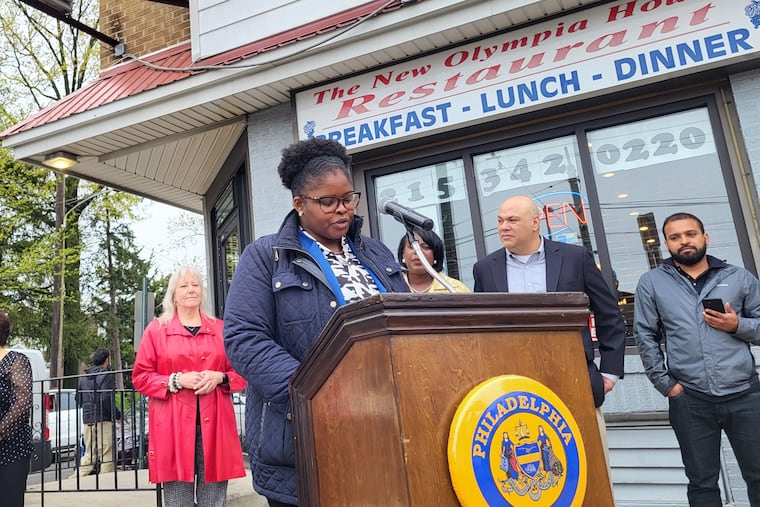Philly’s Castor Avenue business owners say the pandemic knocked them down, but they’re climbing back
About a half dozen small business owners in Northeast Philly's Castor Avenue corridor helped kick off National Small Business Week, noting how they are hungry for technical help and marketing.

Lambros Karazournias likes to tell the story of his father leaving his native Greece, joining the merchant marine to see the world, and then one day jumping ship in America.
“He came through New York, then he found out it was too expensive in Manhattan to open a business, so he moved to Philadelphia,” and in 1987 founded the New Olympia House restaurant on 7242 Castor Ave.
“It really was the American dream,” Karazournias said.
Karazournias’ father operated the restaurant with his wife until he died five years ago. Karazournias the son also worked there and has since taken over.
So when the pandemic shut down almost all small businesses, including his Greek diner in Northeast Philly’s Castor Avenue business corridor, he said “we had to really pull together.”
On Monday, he and about a half-dozen other small business owners helped open National Small Business Week. It was an event organized by Ninth District Councilmember Cherelle Parker and the Pennsylvania CDFI Network, which disbursed the first round of $225 million in pandemic assistance to small businesses throughout the state.
National Small Business Week runs from May 1 to May 7. Business owners from Castor, Cottman, and Bustleton Avenues and surrounding commercial corridors “really drive economic opportunity and define who we are, in Northeast Philadelphia, especially the great diversity we have,” said Shante Antrom, executive director of the Oxford Circle Christian Community Development Association.
“Not only do small businesses here need outdoor seating, but they need access to capital, technical assistance, [and] business classes in marketing,” she said. “They are the lifeblood of the community.”
At least one business owner said she survived only after receiving government aid.
Lola Ouo, an insurance broker and owner of RightChoice insurance agency at 6911 Castor Ave., said that “almost all business activities stopped. My customers couldn’t pay their premiums or even afford insurance. We were helpless. But as a human being we never cease to hope, and depend on each other.”
Her business received roughly $20,000 through a forgivable loan from the Small Business Administration to pay rent, taxes, and payroll, she said.
During the pandemic, Luisa and Juan Hurtado’s two Magaly Spa locations — one on 6406 Castor Ave. and another in King of Prussia’s Courtside Square Shopping Center — also received a $25,000 forgivable loan to paint, remodel, and pay the couple’s 10 employees.
“We really needed the help,” Juan Hurtado said.
Still, two years on, small-business owners and entrepreneurs are hungry not just for capital, but for technical help and marketing assistance.
“They need setups with sales leads, storefronts, contracts with the city, even security cameras,” said Leslie Benoliel, director of Entrepreneur Works, a nonprofit that offers free classes and contacts with banks and other lenders.
Pulling back up
Karazournias and other local restaurateurs applied for a $30,000 grant to install outdoor seating, a necessity as a precaution against COVID-19.
New Olympia, Tio Pepe, On Charcoal and Buccann dining establishments installed outdoor seating through the grant, and Design Collaborative donated its time and talent for the design work.
“Outdoor seating was never here [on the corridor], and we needed it, because people really want it,” said Karazournias. He and others also revived the Castor, Bustleton and Cottman Business Association, a group of about 60 business owners lobbying for assistance in the neighborhood and helping one another.
Federal funds in limbo
Roughly $1.7 billion in federal funds is available for small-business assistance, but is locked up amid political wrangling in Harrisburg. The state was originally allocated about $7 billion in federal relief money from the American Rescue Plan, signed by President Joe Biden last year. Just under $2.2 billion remains.
“There are billions of federal dollars available, but we’re trying to drive some infrastructure and other projects through for the commonwealth” in addition to small-business help, said State Rep. Jared Solomon, a Democrat who represents the 202nd legislative district.
Gov. Tom Wolf wants the money disbursed to those hurt by the pandemic, but the allocation must be approved by Pennsylvania’s Republican-controlled legislature. The federal funds are given out separately from the state budget.